© 2014-


Radio 270 - History (2)
The station suffered technically, too, with a faulty power supply causing records and tapes to play at erratic speeds and there was a general lack of quality in the recording of commercials and jingles (many of the latter having been pirated off air from other offshore stations). During its first few weeks of broadcasting Radio 270 was frequently closed for 'essential maintenance', a euphemism for repeated generator failures, a problem which was to plague the station throughout its life even until its final few moments on the air 14 months later.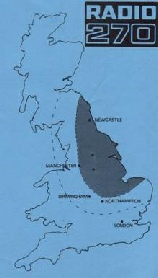
Before Radio 270 opened the station had announced that its programming would be aimed at a local audience and it did carry a significant amount of local advertising as well as community announcements and charity appeals. To encourage local businessmen to advertise the station introduced free introductory spots for very small advertisers with subsequent rates discounted. Radio 270 also gave a lot of air time to charitable organisations such as local Rotary clubs, children's homes, the Royal National Lifeboat Institute, Oxfam, the Salvation Army, and Wireless for the Blind, for which it raised over £500 through sales of "Fight for Free Radio" car stickers at one (old) penny each.
One operatio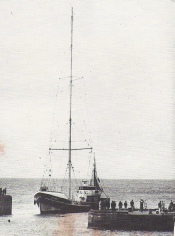 nal aspect, which was also unique to Radio 270, was the absence of a regular tendering vessel to deliver bulk supplies of food, fuel and water. When these were needed the Oceaan VII sailed into port, usually Bridlington Harbour, loaded whatever was required and returned to her anchorage in international waters.
nal aspect, which was also unique to Radio 270, was the absence of a regular tendering vessel to deliver bulk supplies of food, fuel and water. When these were needed the Oceaan VII sailed into port, usually Bridlington Harbour, loaded whatever was required and returned to her anchorage in international waters.
The Bill to outlaw offshore broadcasting stations -
The initia l reactions from the offshore stations to the Bill were defiant, containing general expressions of determination to fight its introduction and continue broadcasting. Radio 270 Managing Director, Wilf Proudfoot, promised that his station would find ways of getting round the legislation, if it ever succeeded in progressing beyond the First Reading stage. The station launched a campaign urging listeners to write to their MPs and 'fight for free radio'.
l reactions from the offshore stations to the Bill were defiant, containing general expressions of determination to fight its introduction and continue broadcasting. Radio 270 Managing Director, Wilf Proudfoot, promised that his station would find ways of getting round the legislation, if it ever succeeded in progressing beyond the First Reading stage. The station launched a campaign urging listeners to write to their MPs and 'fight for free radio'.
Radio 270 continued to experience technical difficulties throughout the latter half of 1966 resulting in frequent breaks in transmission. However, a problem of a different sort arose in October 1966 when an un-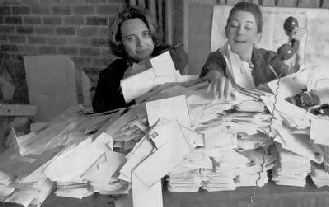 re in.
re in.
A call was eventually put through to the radio ship but only after Managing Director, Wilf Proudfoot had contacted the Postmaster General personally, and Police had repeatedly requested Humber Radio to relax the ban.When they eventually received the message the crew searched the ship, but found nothing.
Radio 270 was off the air again at the beginning of November 1966 and on 3rd November the Captain of the Oceaan VII made an emergency call saying his vessel had a seized main shaft and required urgent assistance. The radio ship was towed into Scarborough for repair and within a few days was able to return to her anchorage, enabling Radio 270 to resume transmissions. However, the unfortunate station suffered further breaks in transmission later in November and early December 1966 due to storm damage and eventually it was decided that the ship should move to a more sheltered anchorage off Bridlington.

Radio 270’s claimed coverage area

Click on picture to enlarge
Oceaan VII entering harbour for supplies
Radio 270’s Office Manager, Maggie Lucas (left) and colleague, coping with the huge amount of fan mail received by the station
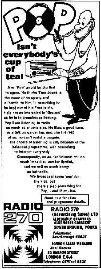
Trade press advert promoting -
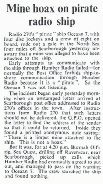
The Times
29th October 1966
Promo encouraging local advertisers to buy airtime on the station

‘Support Free Radio’ promo

Couplands



Bob Grocers



History
Key Dates
Ship and Location
Technical
Staff
Programmes






For more about
Radio 270 visit
in the Special Exhibitions Gallery on the Ground Floor


Treasure Chest





Back to Britain Gallery


Back to Radio 270
